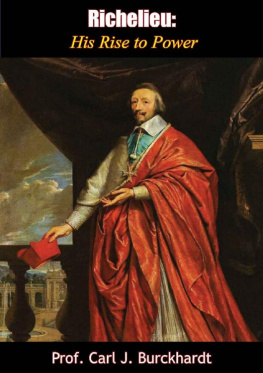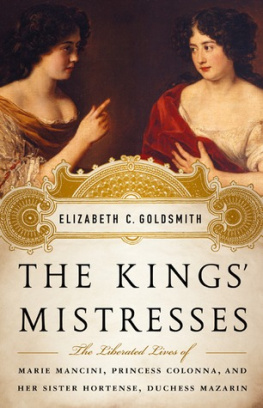THE EARLY YEARS OF MAZARINS MINISTRY
1643-1646
Youth of Mazarin His employment by Richelieu Death of Richelieu and of Louis XIII.Mazarin First MinisterThe situation in FranceRocroiRise and fall of the Importants Policy of the great noblesStrength of the government Financial difficultiesThe opposition of the parlement of ParisThe battles of Dttlingen, Freiburg, Mergentheim, and NrdlingenThe war between Sweden and DenmarkMazarins diplomacyThe Peace of BrmsebroResults of V NrdlingenThe failure at OrbitelloThe capture of Dunkirk Mazarins position in 1646 and 1647Arrival of some of his relationsNecessity for a vigorous foreign policy.
Richelieu died on the 5th of December 1642; on the following day Louis XIII. announced that he had chosen Mazarin to be First Minister. Giulio Mazarini, or Jules Mazarin, as the French call him, was born on July 14, 1602, at Piscina, a small village in the Abruzzi. His father was a certain Sicilian, by name Pietro Mazarini, his mother was Hortensia Buffalini, who was renowned for her beauty. To the latter the young Giulio owed much of his future success, for it was due to her efforts that he first studied under the Jesuits at the Roman College, and later at the University of Alcal in Spain. He had early shown signs of uncommon talents, and he was at the age of sixteen remarkable for his.handsome face and natural brightness. On his return to Rome about the year 1622, he entered the pontifical army, only to find that his real mtier was diplomacy. He had studied civil law and had taken his degree of doctor in utroque jure, and under Cardinals Barberini and Sachetti he plunged into the tangled maze of Italian politics. Service under the Pope gave him an unrivalled opportunity of making himself acquainted with the political state of Europe, and of practising that adroitness and persuasiveness which proved so valuable when he became First Minister in France. Idleness was never one of his faults, and during these years in the service of his master at the Vatican Mazarin showed himself indefatigable, subtle, and successful. By his patience and industry he soon acquired an insight into diplomatic mysteries, and till the end of his life was pre-eminently a diplomatist of the first order. His ability was fully recognised by the Cardinals Barberini and Sachetti, and the war of the Mantuan succession brought him into contact with Richelieu.
On March 30,1630, the French had captured Pinerolo, the fortress commanding the exit of the chief pass from Dauphin into Italy. The Spaniards and Imperialists offered to negotiate, and Mazarin, who was employed as papal legate, attracted the notice of the French cardinal. The negotiations came to nothing, as Richelieu refused to yield Pinerolo. When, later in the year, Csale, besieged by Spinola, was hard pressed, Mazarin, in the absence of Richelieu, who had returned to France, arranged a truce at Rivalta on September 4, very much to the advantage of the beleaguered garrison, it is not to be wondered at that Richelieu should have decided to secure the services of the young Mazarin, for whom he procured a cardinals hat. Richelieus confidence in his protg was not misplaced, and on his death-bed he recommended Mazarin to Louis as his successor.
Before, however, Mazarin could establish himself firmly in power, and continue and complete his predecessors policy, Louis XIII. died, and an opportunity was given for an outbreak of all the discontent which had been seething in France during Richelieus later years. Louis died on May 14, 1643; on May 18 the parlement of Paris, anticipating the action of its successor in 1715 on the death of Louis XIV., abolished the council which by the will of the late king had been set up, placed the supreme power in the hands of the queen-mother, Anne of Austria, an easy-natured but at the same time a proud and capable woman, and appointed Gaston, Duke of Orleansa mere puppet in the hands of any strong manlieutenant-general of the kingdom. This conduct of the parlement, and the attitude which it adopted, Vas due to the belief of its members that their political influence would be restored, that Mazarin would retire to Italy, and that the whole policy of Richelieu would be reversed. The parlement had thus modified the will of the late king, and had organised the regency. It had, in a word, returned again to political life, from which in 1641 it had been most carefully excluded by Richelieu ; and during the greater portion of Louis XIV.s minority it played a prominent part in the politics of the time. But its pretensions were odious to the queen-mother and to Mazarin, who, while endeavouring till the outbreak of the Fronde to preserve internal peace, was always jealous of any attacks on the royal prerogative. In her attitude of constant watchfulness over her sons rights Anne was ever loyally supported by the cardinal, whom the parlement regarded with reason as its principal foe. The parlement had expected that Anne would prove pliable and carry out its wishes. Before long, however, the queen-mother definitely indicated the position which, as regent, she intended to adopt, and from that moment the rift between the parlement and the government became deeper and deeper.
On the evening of May 18, the queen-mother announced a decision which proved to be a momentous one in the history of the French monarchy. Mazarin was confirmed in his position as First Minister, and the hopes of the parlement were disappointed. The work of consolidating the French monarchy was not to be interrupted, and the policy of humbling the Austro-Spanish house was to be continued.
Hatred of Richelieu as First Minister had been general among the noble class during the greater part of Louis XIII.s reign. Annes announcement presaged the continuance of a system of government which was odious to the feudal as well as to the legal aristocracy. The disaffected, therefore, at once resolved to resist the rule of Mazarin, and a system of uncompromising opposition to the supremacy of an Italian adventurer was organised.
The situation of France was at this time extremely critical. Richelieus death already had disastrous effects on the military administration, and energetic action on the part of the government was necessary. Ammunition was deficient, supplies of all kinds were with difficulty forthcoming, and the bonds of discipline had been seriously relaxed. While the ranks were weakened by frequent desertions, general officers had left their respective posts, and many of the subalterns were absent from their duty. It seemed very doubtful if the army of the North would be able to take the field. Equally serious had been the effects of the death of the great cardinal on the stability of the government. Many persons imprisoned or exiled by Richelieu now returned to Paris, and were ready to avenge their wrongs on his successor. Anxious to secure pensions .and offices, they were wanting in political responsibility, and cared nothing for the welfare of France. The return of these exiles rendered Mazarins position unspeakably difficult, and forced him for a time to adopt a policy of compromise.











